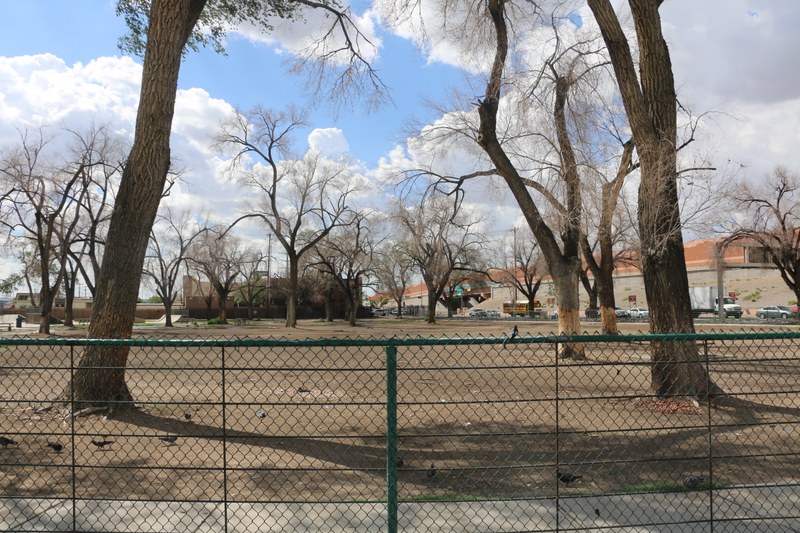
Coronado Park Closed
Crime and hazardous conditions required closure.
ALBUQUERQUE – After weeks of outreach, service offerings and notice, the City closed Coronado Park today, fencing off the empty grounds that had been a hotbed for narcotic usage, trafficking and organized crime. The park had sustained severe damage and it became increasingly difficult for City staff to clean it over the years. Damage to the park’s irrigation system, a dug in-ground pool, pilfered electricity, hazardous trees, and overall lack of sanitation posed increasing health risks to the people in the park.
APD officers have been interacting with people at Coronado Park on a daily basis. Officers report violent crime and drug trafficking occurring more frequently, while victims were more reluctant to report the crimes because they were afraid. This year alone, APD received 418 calls for service directly at Coronado Park. Recent statistics for items confiscated and dangerous situations outline the urgency of closing the park:
- 1 Shotgun
- 3 Handguns
- 4,500 Fentanyl pills
- 3,008 Grams of Methamphetamine (over 5lbs)
- 24 GM's of heroin
- 29 GM's of cocaine
- Several rocks of crack cocaine
- $10,000.00 Cash
- 3 Felony warrants cleared
- 2 Federal warrants cleared
- 85 ACS response (Since September 21)
- 651 APD calls for service (2021) & 418 (YTD 2022)
- 2 shootings (Last 2 years)
- 20 assault and battery reports
Since the beginning of the month, the City has been carrying out intensive outreach and safety operations to connect with people living in Coronado Park and keep the surrounding neighborhoods safe. The effort has focused on helping folks find viable alternatives, cleaning the park, and mitigating negative impacts to area businesses and residents. The multi-pronged approach spans City departments to secure results.
The Solid Waste Department (SWD) and the Parks and Recreation Department (PRD) have actively worked to clean the park and maintain the grounds as much as possible. Last week, SWD removed over 20 tons of waste from the park. Because of the level of waste and damage to the grounds, the teams moved to a weekly clean up schedule leading up to the closure. Damage to the park’s irrigation system, hazardous dead trees, and pilfered electricity from nearby businesses presented urgent concerns both for the long-term viability of the grounds and the safety of those occupying the park. The encampment outreach teams will enforce rules in the area so that the surrounding sidewalks and areas with children’s programing, like nearby Wells Park, are kept safe and clear.
Now that the City has closed Coronado, it will continue to consider next steps, which may range from permanent closure, eventual re-opening as a park, or repurposing for other City uses which may include housing, shelter space or public safety training. Until an appropriate next use decision is reached, the park will remain closed and outreach will continue to the unsheltered. The park will no longer be a drop-off or pick-up for the westside shelter, shuttle locations can be found here.
Mayor’s broader remarks on this issue from today are below:
“The actions taken today by the City of Albuquerque are made necessary by the threats to public health, safety and the environment that this encampment has created. Let no one think, however, that these actions represent a comprehensive strategy for resolving the problem of what we commonly call the homeless in Albuquerque or anywhere else in America.
To do that we must as a society do the following:
First and foremost we must provide the ingredients of a restart for people who have lost housing due to economic circumstances, for people who are mentally ill and not receiving or accepting treatment, and for the substance addicted who also are not receiving or accepting treatment. Some people on our streets today fall into more than one of these categories, and some of them believe they prefer life on the streets to whatever services may be available to them.
What I am saying is that we as a society must provide the ingredients of a restart. But the ingredients of a restart are not guaranteed lifelong security, rather they are the chance to begin again to rebuild a full, independent and productive life.
For us to have enough restart housing and treatment for mental illness and addiction, it will take much more than anyone non-profit, church or government: we all have to come together to make this happen. That means every level of government--city, state and federal—and all available private expertise and resources must be brought to bear and coordinated to solve this problem.
And as we do that, we as a City and as a society have the right to insist that all our public spaces are used for the common use purposes for which they were created—not misused because some people don’t want to do what they can to get better, to take advantage of a restart.”

